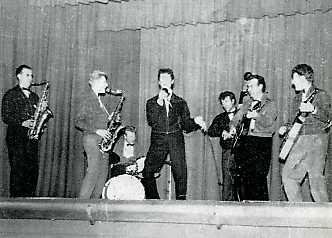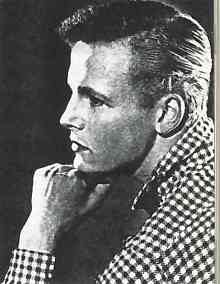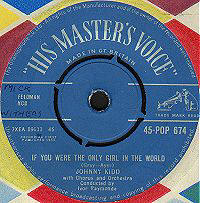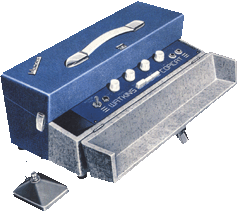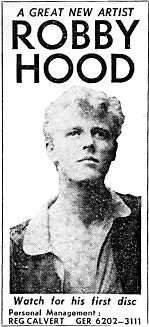|
|
1: 1956-59: From Skiffle To Rock
Although the honour of the first true British rock Ďní roll single goes to Cliff Richardís "Move It" in 1958, Johnny Kidd and the Pirates can justly claim to be one of the major British rock acts prior to 1962. Along with Cliff and the Shadows they had much influence on groups that broke onto the Beat scene in 1963. Travelling up and down Britain, come rain or shine, Kidd and his Pirates were the best known among the trailblazing instigators of what became "Beat" music, along with bands like Cliff Bennett and the Rebel Rousers, Neil Christian and the Crusaders and Screaming Lord Sutch and the Savages. Johnny Kidd was born Frederick Albert Heath in Willesdon, London, on 23 November 1935, the youngest of three children. At the age of three he was evacuated to the Buckinghamshire countryside when the Second world War began, then later into Wales before the bombing and the war eventually wound down and the family - along with many others - was reunited. After the war, times were hard with a shortage of money and rationing of even the most basic items. Heath and his friends found enough to occupy themselves with playing games around bomb sites. One popular pastime was "Yank-Baiting".
Heath's musical seeds were sown toward the end of 1956 when England was in the grip of the Skiffle craze, when Frank Rouledge bumped into Brian Englund and Fred Heath one evening at Ikes Snooker Hall. Englund played banjo and Heath claimed to know some chords on guitar so all decamped back to Frank's home where he played lead. After hours of mulling over possible band names they came up with Bats Heath and the Vampires and completed the line-up by enrolling Clive Lazell on washboard. At one time the group was known as the Frantic Four in homage to Don ("Witch Doctor") Lang's Frantic Five. By the end of the year, Englund had dropped out, Lazell had moved over to drums and Brian Donelan had been drafted in on washboard. The group had a collective sense of humour, and Donelan in particular was a zany character which helped inspired the next group name change to the Five Nutters. To perform at a special gig the group once had to bail Donelon out of Pentonville Prison! The final addition at this stage was bass player Johnny "Fruit" Gordon from Dusty Bohen's Skiffle Group.
Their repertoire comprised not only Skiffle favourites like "Cumberland Gap" and "Don't You Rock Me Daddy-O" but also rock 'n' roll tunes ("Blue Suede Shoes", "Rock Around The Clock"), pop ("Butterfly") plus a group original, "Blood Red Beauty", a reference to the red-haired Ada, who was Fred's wife. A typical week saw them performing on six nights. Coming a close third at a large Skiffle competition was soon followed by another competition, this time organised by Carol Levis who was coming to town with his Discoveries Show and the venue was the Metropolitan on the Edgware Road. Like "Opportunity Knocks" and its "clapometer", the audience reaction to each group was measured during an encore at the end. The loudest seemed to be for the Nutters but again they came third. After remonstrating with Levis about the possibility of fixing, they were promised television work - which didn't come off - and some prestigious dates - which did. More competitions ensued - some of which they won - plus better gigs such as the Two I's. Fred had started to write some songs and came up with some radical ideas such as trying out a song which had only one chord all through it. As Rouledge noted, the tune "went down a storm....couples were soon jiving and stamping to this primitive sound". The BBC with its lack of interest in pop were late to the skiffle party, which was past its peak when BBC Radio's "Skiffle Club" (which evolved into "Saturday Club") eventually hit the air. Nevertheless the Nutters appearance on it was the highlight of this groups' existence. Heath, Lazell, Donelon and Rouledge even cut two tracks, "Shake, Rattle And Roll" plus "Blood Red Beauty" at Wilkinson's Radio Shop, which still exist today. As Skiffle declined, so the Nutters hung up the washboard for good. Local entrepreneur Don Toy, who had a contract with the local working men's clubs to supply all kinds of musical acts from groups to orchestras, had actually seen the Nutters in action once, but was unimpressed. He re-thought his opinion on being introduced to Heath and between them formed what would become the Fabulous Fred Heath Band with an expanded and flexible line-up. Toy was the manager, agent, promoter and even drummer and started the Krazy Curzon Klub at the White Horse pub in Willesden High Street for some months until the landlord became greedy, and the group played one final gig outside in the street in protest, managing to snarl up the road around as people danced to the impromptu performance. The Fabulous Freddie Heath Band simply fell apart after this let down but not before Guy Robinson became involved with the group. Robinson was involved with the Mike West Group, the resident band at Wandworth Town Hall, and introduced Heath to them. He guest-performed "If You Were The Only Girl In The World", after which He joined the group full-time and roped in Fruit Gordon as the full-time bassist.
The group renamed themselves the Fred, Mike & Tom Show, and all three singers shared the limelight before West and Brown stepped aside to allow Heath, the better vocalist take centre-stage. Alan Caddy (lead guitar), Tony Doherty (rhythm guitar) and Ken McKay (drums) were the other group musicians who were joined by Johnny ("Fruit") Gordon (bass) to comple the line-up. Don Toy, who'd run a business producing sound equipment, constructed a dedicated bass guitar amplifier for Gordon where usually a guitar amp would have been used for an electric bass. This huge cabinet, which put out two hundred watts (and said to make the Town Hall floor vibrate) was very heavy to move. In return, Gordon designed the red cut-out guitars used by the group. Heath had always wanted to write songs but was unable to garner enough interest in the 30 written during a three-month period. He'd been working as a house painter but by this time he was getting hard-up and desperate. The 31st song started life as a catchy title and chord sequence that developed into "Please Donít Touch". It sold and The Bachelors (a duo unrelated to the later Irish trio) recorded the first version on EMIís Parlophone label (45-R 4547) but it failed to sell. In the meantime HMV scouts visited the Town Hall to view the band in action, whose performance was described as a "disaster". Guy Robinson, now the manager of the group, was mad at them but as luck would have it HMV returned at a later date and Walter J. Ridley, manager of EMI's HMV label was introduced to the group after a gig in a corrugated tin sheet hall in Elstree.
Heath's successful test led to a recording contract on the companyís HMV label under Producer Walter J. Ridley who was used to the likes of Ronnie Hilton and the Joe Gordon Folk Four. He usually left the Rock Ďní Roll to his more than capable chief engineer, Peter Sullivan. Under Sullivan, Freddie Heath and The Nutters - as they were now called - entered Abbey Road Studios on 18 April 1959 to record their own version of "Please Donít Touch", the master being edited from the best of 28 takes. Heath was the only one directly contracted to HMV. The rest of the group - these and all future band members - were paid as session men, in this case 7 Pounds and 10 shillings. As Mike West noted: "We all thought we were well off!" When during proceedings they were given a slip of paper referring to the "Johnny Kidd and the Pirates recording session", Heath exclaimed "who the hell is that?" A voice spoke out, "from now on that's your recording name." It was never divulged to them where the idea came from, although it was possibly Peter Sullivan's or Guy Robinson's.
"Please Donít Touch", was released on May 8th 1959 and was pure, raw, gutsy, rock 'n' roll, with a frantic guitar intro, driving bass and drums and, above all, authentic, powerful vocals from Kidd, making an instant classic. The B-side, "Growl", kept the pace up despite being thrown together during the session itself. Agent Don Toy, a handy drummer who'd appeared with The Freddie Heath Band when required, actually played on the session as Ken Mackay's timing was out. He continued to fill in from time to time especially when MacKay left on the day the record was released.
Guy Robinson flew out to court the leading Radio Luxembourg DJ's by wining and dining them. Unsurprisingly, the record received increased airplay which undoubtedly assisted sales. At the time Billy Fury was the only other rock Ďní roller consistently writing his own material in the UK. Everyone in the business believed the record should have gone to number one, however there was a National strike at the time, and the resultant lack of promotion (in the UK at least) left the single bobbing around an encouraging 25 in the UK charts. In "Melody Maker" of 13th June it went as high as 20. The cut left such an impression that American Rocker Chico Holiday released a cover version in the States (an event virtually unknown for the era) which saw the light of day in the UK on an EP "Chico Holliday" (RCA 171). |
|
|
|
|
|
|
|
Kidd and co's first big tour was a Tito Burns production compered by a youthful Jimmy Tarbuck that covered the American bases across the country. Although a coach was used - a comparative luxury - they had to return home each night, which often meant the early hours of the following morning. For this tour a rehearsal room in the Charing Cross Road was booked, and the other acts included Lisa Noble, The Carson Twins (an all-girl harmony group) and Bill & Brett Landis, an (unrelated) UK answer to the Everly Brothers. Guy Robinson was very enthusiastic about the band and began giving Heath lessons in stagecraft, dressing the group in bright costumes. Kidd wore a red shirt and lime green suit, with the Pirates wearing orange shirts and striped jeans. Around this time Don Toy built a tape echo device for Kidd's vocals in an attempt to replicate the recorded sound on stage, a first in Britain. This probably prompted Kidd later purchasing the first compact "Copicat" echo device produced by WEM (Watkins Electric Music). This portable unit used loops of tape to produce variable feedback echo and became the sound of the Shadows' exciting lead guitar lines as played by Hank Marvin, which inspired so many others. The Copicat was a much condensed system that replicated studio echo that up till then was produced by running two hefty tape machines in tandem, with loops of tape running between each. The sound was similar to that used on Marino Marini's recent contemporary big hit "Volare", and which was the driving force behind the Copicat's production. WEM, which was later overlooked compared to the likes of Marshall and VOX is still run by founder Charlie Watkins - their website contains a very interesting potted history of the company and original products - direct link can be found here. Charlie himself is seen holding what is left of Kidd's original Copicat serial number 0001 which was anonymously returned to him a few years back. An appearance on the June 6th edition of the BBC radio show "Saturday Club" introduced the group to a far wider audience. The importance of such shows on the BBC - few and far between as they were - and radio Luxembourg cannot be underestimated and were essential in promotion for the artist and essential listening for any teenager interested in pop music. Sessions for each show were held on the Tuesday prior to broadcast where around five songs were recorded straight onto tape, and this is what what was played out during the broadcasted programme. Only in a disaster would a re-take be attempted. The lads may have been nervous when attending the Playhouse for their BBC recording session but at least they had a laugh when the mickey was mercilessly taken out of Mike West for wearing an eye-patch to cover a nasty sty in his eye. Ever one for a good idea, Kidd would Later fully exploit the prop. The broadcast was so well received that the group re-appeared three weeks later.
With something special under their belts, a follow up was required. The band congregated at Abbey Road but Johnny was nowhere to be found. The rocked-up old standard "Yes Sir, That’s My Baby" was a stage favourite, however once Johnny arrived hotfoot from his Bournemouth beach hideaway the session was not up to standard and the song was duly shelved. (It was later released in error on the revitalised "Shakin' All Over" single in 1976.) Another oldie was eventually some seven months after the debut, the comparatively easy-going "If You Were The Only Girl In The World" replete with Ivor Raymonde’s orchestra and chorus. Although a stage favourite since Heath's Wandsworth Town Hall days (the song was effectively Kidd's "audition" piece with the band) the single failed to follow their debut into the charts. Much more in keeping was the Heath/Robinson B side "Feelin'", in the vein of "Please Don’t Touch" with neat, atmospheric touches, courtesy of respected session guitarist, Bert Weedon. The single is now sought-out by collectors, if only for the superior flip. Just as collectable is the little-known export issue with a black label, (catalogue number HMV JO674). A third number from the same session was the pleasant "Steady Date," Kidd’s most overtly "Puppy Love" recording. It remained unissued until 1983 on the "Rarities" LP. Kidd signed a one-year management deal with Stanley Dale's Associated London Scripts, whose books also listed the likes of Spike Milligan and Eric Sykes, along with Marty Wilde and the Wildcats, Jim Dale and the Vipers Skiffle Group, amongst others. One of the first bookings for his new management sends the group to appear in Dale's Rock Show at the Coronation Hall, Kingston-Upon-Thames. When not fully booked, the group would appear at Dale's other venues including the Top Ten Club, and venues as far-flung as Aylesbury, Hatfield, Borehamwood and Ramsgate. |
|

